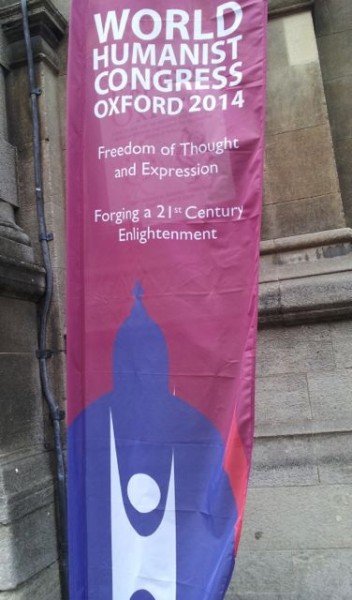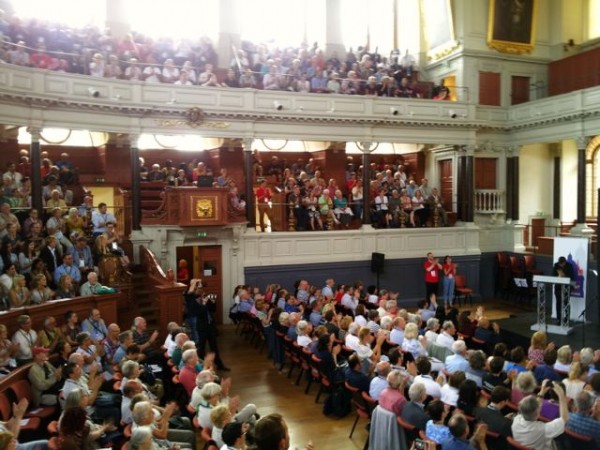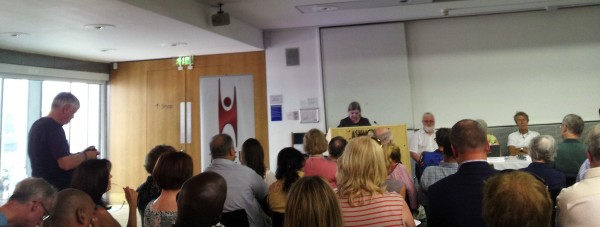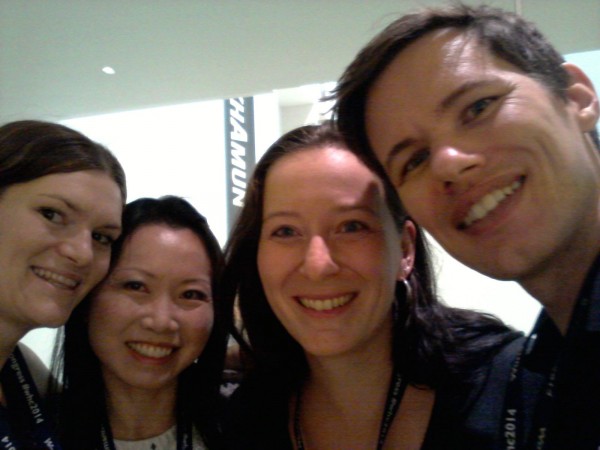This year, the World Humanist Congress took place in Oxford, England from 7 – 10 August. Our committee member Huifen attended the Congress – here is her experience of it.
Introduction
The International Humanist and Ethical Union (“IHEU”) is the umbrella body for humanist, atheist and secular groups globally. The Humanist Society (Singapore) (“HSS”) is an associate member, meaning that we have observer status at the general meetings but no voting rights. Concurrently, HSS is a full member of the youth wing of the IHEU, known as the International Humanist and Ethical Youth Organisation (“IHEYO”). HSS has voting rights at IHEYO.
Every three years, the IHEU organises a World Humanist Congress in conjunction with its general assembly. The venue for WHC is different every year, and organised together with a member state of the IHEU. In 2014, the WHC was organised together with the British Humanist Association (“BHA”), in Oxford, the United Kingdom. Tickets were expensive and sold out quickly upon release.
Fortunately, I received a free ticket via the Federation of Atheist, Humanist and Secularist Student groups (“AHS”). This was because I am a member of the University of Edinburgh Students Humanist Society, which is in turn a member of the AHS. However, this free ticket only allowed attendance at the plenary sessions, which meant that I was not able to attend the parallel workshops.
Over 7 – 10 August, I was also able to attend the general meeting of IHEU as an observer, and of the IHEYO as a voting member.
The World Humanist Congress
The theme of the WHC 2014 was “Freedom of Thought and Expression: Forging a 21st Century Enlightenment”. About 1000 delegates from over 65 countries attended, mostly from the US, Europe and the UK. The largest contingents were from Norway and UK, with over 100 delegates each.
Being organised by the BHA, it was able to line up various prominent speakers who are UK-based and BHA patrons. These included Richard Dawkins, AC Grayling. Other prominent speakers included those from the US atheist/ humanist community, e.g. PZ Myers, Greg Epstein.
Most of the lectures I attended, were drawn from the speakers’ existing work is easily found online. Therefore, the main draw of the Congress was the chance to meet, network and have long discussions with humanists from all around the world: Australia, Brazil, Croatia, Kenya, the Netherlands, Nepal, Norway, Pakistan, Sweden, the US, and more.
(Above) Full house of humanists at the Sheldonian Theatre, Oxford
I was extremely heartened to see that humanism is a flourishing, international movement. In Singapore at least, we are not prosecuted or persecuted for how we view the world. In many places, non-believers are viewed with suspicion or worse. It is not always easy to be an humanist or an irreligious person.
Given the theme of the Congress, I would have liked to have more discussion about how established humanist groups in developed countries, can help or support people living in countries which do not currently have freedom of expression or freedom of belief. Unfortunately there was not much discussion on this, at least not in the plenary talks I attended.
The most interesting point I learnt was that the Norwegian humanists received funding from their government. The Norwegian government allocates a budget to all groups which represent faiths within Norway, according to the proportion of the population represented by such groups. For this purpose, the Norwegian humanist groups are considered a “faith group” and receive funding. This is the main reason for the large, well-established humanist groups in Norway.
IHEU General Meeting
The IHEU held their general meeting over two days, 7 and 11 August. As I was not aware of this before booking my accommodation, I did not stay for the 2nd part of the meeting. I attended the opening session on 7 August.
The IHEU reported on its work for the year 2013-2014. In particular, IHEU representation at the Human Rights Council has won support from various governments. See more at http://iheu.org/our-work/representation-on-international-bodies/
The stated aim of such representation was that international and regional governmental policy should be in line with humanism principles.
It is worth noting that the IHEU is a small but active and vibrant community. The attendees at the General Meeting appeared to have known each other for years.
(Above) At the IHEU general meeting, with the President Ms Sonja Eggerickx making the opening address
They are also welcoming of new members/ attendees. When I introduced myself and the HSS during the introductory part, I was greeted by an enthusiastic round of applause. People are also curious to find out more about humanist organisations outside of the US and western Europe.
IHEYO meetings
The IHEYO sessions were the most interesting. The IHEYO as the youth wing of the IHEU, takes its membership mostly from members from IHEU organisations. However, humanist groups which consist of/ cater to young people can apply to join the IHEYO separately. For example, during this year’s IHEYO general meeting, existing members were asked to vote on the membership application of three new groups. Most IHEYO members are under 35. The IHEYO is quite new and only set up 9 years ago.
(Above) Huifen with current and outgoing IHEYO committee members
The IHEYO consists of a committee and regional working groups: for Asia, Africa and Europe. The African working group is especially vibrant and has much work to do, as witchcraft and superstitious beliefs still hold strong in many African countries. The HSS plans to send more young members to the next IHEYO meeting, which is supposed to take place in Asia.
The next WHC will be in Sao Paolo, Brazil, September 2017. We encourage all HSS members and supporters to plan for this trip! I certainly plan to attend. Hola Brasil!








